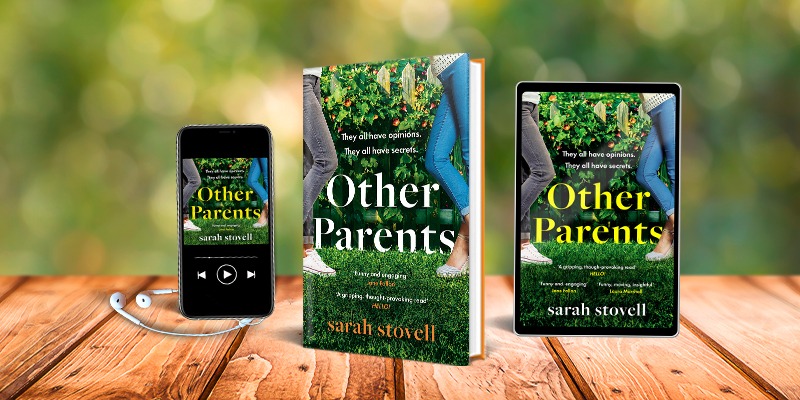Author Sarah Stovell tells us about what inspired the characters in her latest book, Other Parents, out now.
While I was writing the novel that came before Other Parents, I became desperate to write Other Parents. The other novel had become too dark, too disturbing, too much like wading through the bleakest underbelly of the world, and I wanted to get out. I needed a world that was lighter and more familiar.
I usually have several months off between novels, but I started Other Parents almost the minute I finished the last one. It took me six months, from first word to last. That sounds fast, and it is, but the novel had been developing inside me for years. My children then were nine and seven years old, so my life had been set around the school playground for a long time. When my first child started school, I was amazing. A professional. I dutifully made cakes every week for the PTA cake stall; I volunteered to run stalls at the summer fair; I once even considered putting myself forward as parent governor until my partner pointed out that it was a four-year commitment, involved a lot of meetings and I would probably hate it.
Once my second child started school two years later, I was pretty much over it. I volunteered for nothing, avoided all social events, and used to hide behind my umbrella if I saw a member of the PTA approach me. Really, my enthusiasm had just been pretence. I’d been pretending to myself as much as everyone else. I thought that somewhere inside me lurked one of those women who could be a local hero, who could devote her time to supporting her children’s school by making cakes and chutneys, but it turned out that my inability to care very much runs even deeper than I realised.
I don’t care.
That’s the thing. I try really, really hard, but I just can’t do it. It’s not something I’m particularly proud of. I would quite like to care. I just don’t.
I am, however, fascinated by the people who do care, and this is where Other Parents came from. The characters in Other Parents care. They care about the running of the school, about raising funds for the school, about fairness and about social ills. Even the character who pretends not to care at all about anything actually cares very deeply about everything.
These characters and the things they care about formed the basis of the book. I’m not a plotter (though with every new book I swear I will be). I always start with character, and the characters push the story forwards. All I really knew when I started Other Parents was that I wanted to write about the politics of the school playground, and I wanted it to be funny. I thought the easiest way to expose the absurdities of playground politics was through the eyes of an outsider, so I created Erin, a woman who has fallen in love with another woman who has three children, and has had to take on the role of step-mother.
Erin and her partner Rachel are successful, affluent career women. They care less about the world on their doorstep and more about the wider world. Rachel’s job is about exposing inequality and yet it makes her lots of money, so she is a part of the inequality she so loathes. This fact is noted by Laura, the single mother who lives on the other side of town and is struggling to bring up her son. She is angry with a world that has dealt her a rough hand, and angry with people like Rachel, who think they’re helping but who have no idea of the realities of single parenthood, abandonment and struggling to make ends meet.
In the novel, these characters collide: Rachel and Erin who are the broad-minded liberal elite, and Laura, the struggling single mother who wants only to live in a world that has fixed boundaries – where families consist of two heterosexual parents and their children, where men don’t abandon their wives, and where women don’t put their own desires ahead of their children. Laura feels as though the world she wants has been stolen from her, while she sees Rachel having it all and throwing it away for a way of life Laura considers to be immoral.
The characters and their attitudes are polarised, something we see a huge amount of in the world at the moment. In Other Parents, I wanted to explore a tiny fragment of the reasons why the world is so divided, while also showing that, at heart, most people are motivated by what is good and by a desire to be heard and understood.
I dedicated the book to my children’s school. It has been a pivotal part of all our lives for nine years, and my youngest child will leave this summer for the wider world of middle school, where parents are less involved. They don’t hang around the school gates, and only set foot inside the doors for parents’ evenings and productions. I will miss the world of playground politics, but it’s not a world my children particularly care about. Now, I can be even less involved with cake stalls and running the fete, and more involved in the things they love, like travelling to cities for weekends purely so they can experience the joy of Deliveroo, and hosting sleepovers for fifteen teenagers…
Get your copy of Sarah Stovell’s book, Other Parents, here.


